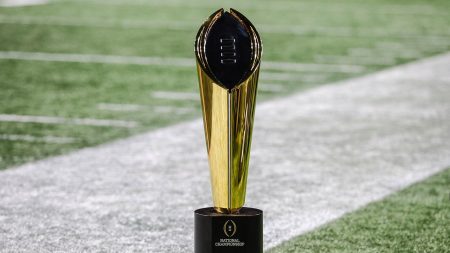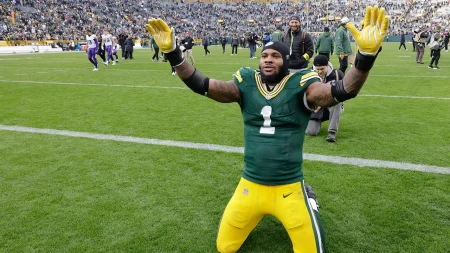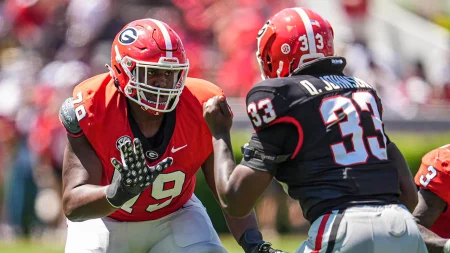Manning’s Debut Sparks Mixed Reactions: A Tale of Expectations and Reality
In a surprising turn of events, Arch Manning’s much-anticipated debut as Texas’ starting quarterback fell short of the enormous expectations placed upon him. After spending two seasons as a backup to Quinn Ewers, Manning finally got his chance to shine in the Longhorns’ season opener against Ohio State. The result was a 14-7 loss where Manning threw for 170 yards with one touchdown and one interception – a performance that has ignited debate across the college football world about whether the young quarterback can truly live up to his famous name. This modest showing has particularly drawn criticism from Heisman Trophy winner and ESPN analyst Desmond Howard, who didn’t mince words when discussing the young quarterback’s performance and the disproportionate hype surrounding him.
The reaction to Manning’s debut highlights the unique pressure that comes with being football royalty. As the nephew of NFL legends Peyton and Eli Manning and grandson of New Orleans Saints icon Archie Manning, expectations for Arch have been astronomical from the moment he stepped onto a football field. Howard, speaking on “The Rich Eisen Show,” was particularly blunt about these expectations, stating that “all of the hype and Heisman talk around him was unwarranted” and that Manning “doesn’t deserve having his name in the same breath as that trophy.” Such harsh criticism from a respected voice in college football indicates just how polarizing Manning’s situation has become – with some viewing him as a generational talent unfairly subjected to enormous pressure, while others see him as a quarterback who may be benefiting more from his last name than his on-field abilities.
Howard’s critique went beyond just Manning’s performance, suggesting that the quarterback’s famous lineage has created a protective bubble around him within football circles. “People don’t want to really criticize him, partially because he is a Manning,” Howard remarked, adding that many analysts “want to stay in good favor with the Mannings, as they are a big name in our sport.” Instead of direct criticism, Howard noted that commentators tend to praise opposing coordinators for “brilliant” game plans that supposedly kept Manning off balance. This commentary raises important questions about meritocracy in sports evaluation – whether certain players receive preferential treatment in analysis based on factors beyond their actual performance, and whether the Manning name creates impossible standards while simultaneously shielding Arch from the criticism that might help him improve.
The professional scouting community appears divided on Manning’s performance and potential, reflecting the complexity of evaluating a young quarterback with such a high-profile background. One NFL scout described Manning’s showing against Ohio State as “tough to watch,” a damning assessment that suggests fundamental concerns about his readiness for elite competition. However, another scout took a more measured approach, implying that it’s far too early to make definitive judgments about Manning’s career trajectory based on a single game against one of college football’s perennial powerhouses. This split opinion mirrors the larger conversation happening around Manning – is he a quarterback still finding his footing who deserves patience, or is he simply not the transformational talent many predicted he would be?
Beyond Manning himself, Howard’s comments also touched on the broader Texas team, suggesting that the Longhorns as a whole weren’t prepared to defeat a program of Ohio State’s caliber in a hostile road environment. This contextualizes Manning’s performance within the larger framework of team dynamics, coaching decisions, and the quality of opposition. It’s a reminder that quarterback play, while crucial, is just one element of a team’s success or failure. The Longhorns’ inability to support their young quarterback with a dominant running game, exceptional protection, or defensive stops all contributed to the disappointing outcome, suggesting that even a flawless performance from Manning might not have been enough to secure victory against such a formidable opponent.
As Texas prepares to face San Jose State in their next game, all eyes will remain fixed on Manning and his development. This upcoming home game represents an opportunity for the young quarterback to silence critics with an improved performance against a less intimidating opponent. The journey of a quarterback – especially one with Manning’s pedigree – is rarely linear, with setbacks and growth opportunities marking the path to potential greatness. Whether Manning can shake off the disappointment of his first start, incorporate lessons learned, and demonstrate the skills that made him such a highly-touted prospect remains to be seen. What’s certain is that the pressure and scrutiny will continue, as is the nature of college football when a player carries not just a team’s hopes but also one of the sport’s most celebrated surnames.















